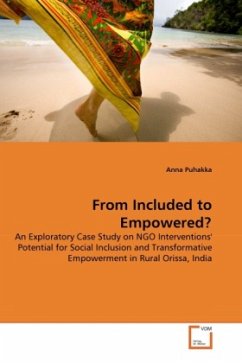Non-governmental organizations (NGOs) have been touted as change agents capable of including the 'weaker sections' as well as empowering them. This book analyzes the NGO-initiated interventions as exemplified by Gram Vikas, an Indian non-profit organization aiming for social inclusion; as well as critically examines these interventions' connection to empowerment in rural Orissa, India. The study sets out to delineate the significant social characteristics that contribute to social exclusion in five case study villages, followed by an analysis of the different forms of power and empowerment which surface in the findings. Finally, a critical discussion is presented concerning the link between socially inclusive measures and transformative empowerment. The research findings underline the importance of intersectionality for NGOs for when they devise their development projects and programmes. In addition, another crucial finding emerges: socially inclusive measures do not automatically guarantee transformative empowerment. This book is aimed at academics, students, all parties involved in international development cooperation, as well as everyone interested in this current topic.








